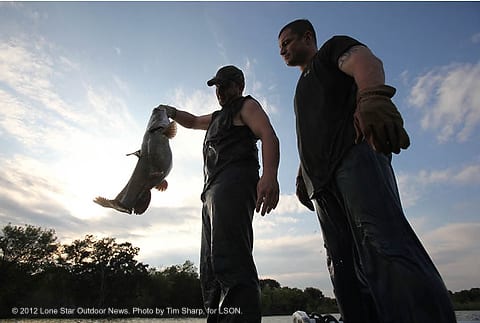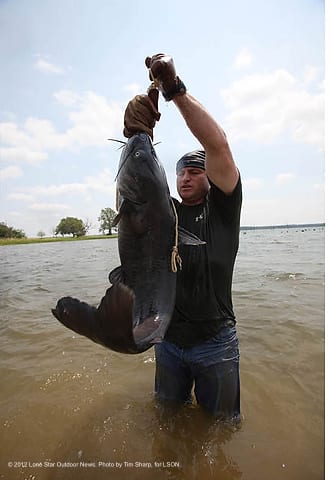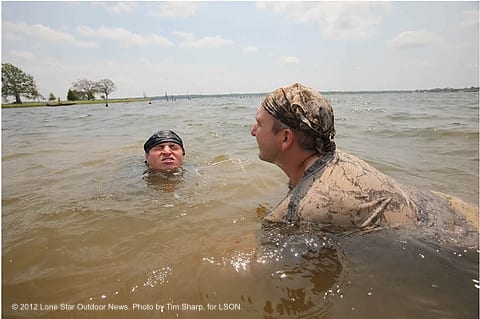 A little more than one year ago it was actually illegal to capture catfish by hand in the state of Texas.
A little more than one year ago it was actually illegal to capture catfish by hand in the state of Texas.
Today hand-fishing catfish, known as noodling, is not only legal, it’s gaining momentum. This May, the state hosted its first-ever tournament, the Lone Star Noodling Tournament, at Lake Palestine. Additionally, fishing guides are now receiving requests from clients interested in experiencing a truly personal and intimate encounter with these fish. Rumors indicate a new television show could even be in the works, as the sport continues to draw interest.
What transpired during this short time period?
Brady Knowlton, a 32-year-old Dallas resident, Texas oilman and outdoor enthusiast, whom local noodlers like to refer to as “The Founder,” decided to challenge an existing law that classified hand-fishing as a class C misdemeanor, with fines of up to $500.
With the help of lobbyist Chris Hosek, Knowlton began efforts to push one of the most talked about bills of 2011 through the Texas Legislature, in an attempt to legalize catching catfish by hand. And he succeeded.
The bill passed unanimously in both the House and the Senate and was signed into law by Governor Perry June 19, 2011 – squarely in the middle of last year’s noodling season.
“I knew, when we first saw the bill, that it would get attention,” Hosek said. “But I had no idea of the amount of attention it would draw. It was one of the most interesting issues I have ever worked on in the Texas Legislature. Even today, Senators and House members are still approaching me with questions about noodling.
“I can’t go to a conference or attend a dinner without someone bringing up the subject; it is fascinating how hand-fishing still resonates here in Austin.”
Knowlton began noodling as a teenager and credits Native American Arlis Whitecotton, with whom he spent summers in Oklahoma, for teaching him the sport and helping instill his admiration for the species. It is believed that American Indians began the tradition and taught the first settlers the practice, which has since been passed down from generation to generation.
 “Up until recently, noodling was only looked at as the lowest form of fishing, the lowest form of interacting with the lakes,” Knowlton said. “It’s the cheapest thing you can do, as far as interacting with nature. You don’t need equipment; you don’t need anything. And anyone can do it.”
“Up until recently, noodling was only looked at as the lowest form of fishing, the lowest form of interacting with the lakes,” Knowlton said. “It’s the cheapest thing you can do, as far as interacting with nature. You don’t need equipment; you don’t need anything. And anyone can do it.”
While noodling may have been outlawed, that didn’t stop long-time lovers of the sport from putting their arms in muddy holes and murky waters in hopes of catching the fish. This long-term tradition was mostly pursued as a covert activity, which often took place on lakes and in rivers at night.
“The fish are large, powerful creatures, and they each have personalities,” Knowlton said. “I enjoy the interaction, and I want to have as many interactions as possible, so I don’t keep the fish. I release them back into their holes.”
Knowlton’s fishing partner, Anthony Salisbury, is a taxidermist in Poetry, and they began hand-fishing together more than six years ago. The two men may have different backgrounds, but one trip to the lake with them, and it’s obvious that they are a tight team.
“You can’t do this safely on your own,” Knowlton said. “It’s a camaraderie type of sport — you need to go with a partner to be effective, one whom you can trust and rely upon.”
While out together earlier this month, Knowlton and Salisbury caught an 80-pound catfish, which is believed to be the largest noodled legally in Texas.
![]()
 So why was it illegal in the first place?
So why was it illegal in the first place?
According to Knowlton, the argument against the sport is that catching these large fish could result in brood failure if the fish aren’t released after they are caught.
“These are special fish,” Knowlton said. “I like to let those genetics spread, and I want more big fish in the water to enjoy. The argument that hand-fishing is bad for the species is completely invalid because whenever you catch a fish, it doesn’t matter when you catch it, it’s not going to breed again.
“If you remove a fish from the population, you remove it from the population; it doesn’t matter the method.”
Hosek found many policy makers were lacking when it came to information on the sport.
“I discovered that a lot of Legislative members had no idea it was even illegal. And no one could answer the question of why it was outlawed when so many surrounding states were supporting it,” Hosek said.
According to Knowlton, the real debate through history has been a sociological one.
“More than 100 years ago, trout fishermen and the elite class of society wrote the laws and oversaw much of game regulation,” he said. “At the time, they decided it was unsporting … but the real debate through history has been a sociological one.”
Knowlton is no stranger to the outdoors. He has fished and hunted across the globe.
“This is the most fun that I’ve ever had interacting with nature, by far,” he said. “This is the extreme side of fishing. You make direct contact with these fish and the rush is much different than when a fish bites your lure.”
Before it was legal, Knowlton and Salisbury only knew a few other people who hand-fished, but now they find people coming out of the woodwork — another sign that the sport is catching on.
“I want people to see this different side of nature,” he said. “What’s different about noodling compared to other outdoor activities and compared to other types of fishing, is that noodling is uniquely American, and there are few things in our society that are uniquely ours.
“We’re a country without many of our own traditions. And although this is a subculture, it’s a uniquely American subculture.”
“We’re bringing back the oldest sport in the nation,” Salisbury said. “The Indians were doing this before there was a rod and reel; this is the oldest sport in North America, there’s no doubt about it.”
Knowlton agreed.
“This is like pioneer American-type activity, and it’s a hell of a lot of fun,” Knowlton said. “Though it’s certainly not for everyone, it’s something I enjoy introducing to others, so long as it’s done safely and responsibly.”

